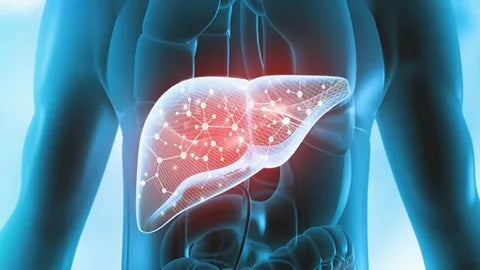
The Worst Foods for Your Liver: What to Avoid for Optimal Health
Share
Introduction: Why Liver Health Matters
The liver is one of the most vital organs in the body, responsible for essential functions such as detoxification, nutrient metabolism, and bile production. It plays a key role in filtering toxins, regulating blood sugar levels, and producing proteins necessary for overall health. However, poor dietary choices can put significant stress on the liver, leading to conditions like non-alcoholic fatty liver disease (NAFLD), inflammation, and even liver failure. Understanding which foods can harm your liver is crucial for maintaining long-term health.

How Diet Affects Liver Function
The liver processes everything you eat and drink, making diet one of the biggest factors in liver health. Consuming too many processed foods, unhealthy fats, refined sugars, and alcohol can overburden the liver and contribute to fat accumulation, insulin resistance, and inflammation. Conversely, a balanced diet rich in whole foods, lean proteins, and healthy fats helps support liver function and prevent disease.
Foods That Harm Liver Health
1. High-Fructose Foods: The Silent Culprit
Fructose, found in sugary drinks, candy, and processed snacks, is metabolized almost exclusively by the liver. Excessive fructose consumption forces the liver to convert it into fat, increasing the risk of NAFLD. Over time, this leads to insulin resistance and inflammation, making it harder for the liver to function properly.
Studies show that high-fructose diets contribute to liver disease by promoting fat accumulation and oxidative stress. To protect your liver, limit sugary sodas, fruit juices, and processed sweets in your diet.
🔎 Related Topic: Nutritional Deficiencies: White Hair, Scaly Flaky Skin, Bone Pain & More
2. Alcohol: The Biggest Threat
Alcohol is one of the most harmful substances for liver health. When metabolized, alcohol produces toxic byproducts like acetaldehyde, which damage liver cells and cause inflammation. Chronic alcohol consumption leads to fatty liver disease, alcoholic hepatitis, and eventually cirrhosis.
Even moderate alcohol intake can strain liver function, so limiting or avoiding alcohol is key to liver health. Hydration and a nutrient-dense diet can help counteract some of the effects, but prevention is the best approach.
3. Processed and Fast Foods: A Hidden Danger
Processed foods contain high levels of unhealthy fats, sugars, and artificial additives, all of which place stress on the liver. Many processed foods also contain high-fructose corn syrup and trans fats, both linked to NAFLD and increased liver inflammation.
Fast foods, packaged snacks, and frozen meals often contain harmful preservatives and additives that overwork the liver’s detoxification pathways. Reducing consumption of these foods helps maintain liver function and overall health.
4. Trans Fats: The Worst Type of Fat
Trans fats, commonly found in margarine, fried foods, and baked goods, are artificially hydrogenated fats that increase the risk of liver disease. These fats promote liver inflammation, increase fat accumulation, and impair the liver’s ability to process nutrients.
Eliminating trans fats from your diet by avoiding fried and processed foods can significantly reduce liver damage over time.
🔎 Related Topic: 3 Silent Warning Signs of a Stroke You Should Never Ignore
5. Sugar-Sweetened Beverages: Liquid Calories That Hurt Your Liver
Sugary drinks, including sodas, energy drinks, and sweetened teas, are a leading cause of NAFLD. These beverages are often high in fructose, which rapidly converts into fat when consumed in excess.
Unlike naturally occurring sugars in fruits, added sugars in beverages lack fiber, making them easy to overconsume. Regular intake of sugary drinks is linked to insulin resistance and increased liver fat storage. Choosing water, herbal teas, or unsweetened beverages helps reduce the risk of liver disease.
Protecting Your Liver with a Balanced Diet
A healthy liver relies on a balanced diet rich in whole foods. To support liver function:
- Prioritize nutrient-dense foods like leafy greens, berries, whole grains, and lean proteins.
- Incorporate healthy fats from sources like avocados, nuts, seeds, and fatty fish.
- Reduce intake of processed foods, refined sugars, and saturated fats.
- Stay hydrated with water and herbal teas to aid detoxification.
- Limit alcohol consumption to prevent long-term liver damage.
🔎 Related Topic: Top 3 Kidney-Cleansing Foods to Support Healthy Kidney Function
Conclusion
The foods you eat play a major role in liver health. By avoiding high-fructose foods, alcohol, processed foods, trans fats, and sugary drinks, you can reduce your risk of liver disease and maintain optimal function. Instead, focus on a balanced, nutrient-rich diet that supports liver detoxification and overall well-being. Your liver works hard to keep you healthy—give it the care it deserves by making smarter food choices.
Frequently Asked Questions (FAQ)
1. What are the worst foods for liver health?
The worst foods include high-fructose foods (sugary drinks, candy), alcohol, processed and fast foods, trans fats (margarine, fried foods), and sugar-sweetened beverages.
2. How does sugar affect the liver?
Excess sugar, especially fructose, forces the liver to convert it into fat, increasing the risk of fatty liver disease and insulin resistance.
3. Can alcohol damage the liver even in small amounts?
Yes, even moderate alcohol consumption can strain liver function. Chronic intake increases the risk of fatty liver disease, inflammation, and cirrhosis.
4. What foods support liver health?
Leafy greens, berries, whole grains, lean proteins, healthy fats (avocados, nuts, seeds), and plenty of water help detoxify and support liver function.
5. How can I improve liver health naturally?
Avoid processed foods and alcohol, eat nutrient-dense meals, stay hydrated, and maintain a healthy weight through balanced nutrition and exercise.


